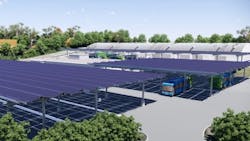AlphaStruxure begins construction of integrated microgrid and charging infrastructure project for RideOn
AlphaStruxure will begin construction on the Brookville Smart Energy Bus Depot, an integrated microgrid and electric bus charging infrastructure project in Montgomery County, Md.
The Brookville Smart Energy Bus Depot will be built and operational by mid 2022, supporting 44 electric buses within RideOn, Montgomery County’s public transit fleet, by 2023.
Montgomery County leveraged its energy purchasing regulations to create a public-private partnership with AlphaStruxure, which was announced in May 2021. AlphaStruxure, a joint venture of Schneider Electric and the Carlyle Global Infrastructure Opportunity Fund, will design, build, finance, own and operate the project, providing a holistic solution for large-scale fleet electrification. Mortenson will provide construction services and Arup will serve as engineer of record for the project.
The microgrid and charging infrastructure will be delivered at no upfront cost to the county through an Energy-as-a-Service (EaaS) contract, a long-term agreement ensuring predictable operating expenses and guaranteed performance for sustainability, resilience and reliability.
“Decarbonizing the transportation sector is critical to mitigating climate change, making fleet electrification an utmost priority for local governments and transit agencies. But the transition to zero-emission fleets is not without its challenges,” said Juan Macias, CEO of AlphaStruxure. “With AlphaStruxure, fleet owners and operators have a trusted partner in realizing their electrification, sustainability and resilience goals with The Carlyle Group's comprehensive financial capabilities and Schneider Electric's leading distributed energy and digital automation technology.”
Statewide, Maryland is working towards a 50 percent zero-emission bus fleet by 2030. The Brookville Smart Energy Bus Depot is aligned with Montgomery County’s priorities to reduce emissions from public transportation while enhancing the resilience of the community and infrastructure assets.
“The Brookville Smart Energy Bus Depot project falls in line with our ambitious climate action plan to reduce all carbon emissions by 2035,” said Montgomery County Executive Marc Elrich. “This bus depot is one component of many county projects that is making a difference for our environment such as converting our fleets to electric and reducing harmful emissions. This infrastructure project will improve the county’s resilience and we are proud to be at the forefront amongst local governments when it comes to projects like this.”
The 5.6 MW microgrid includes distributed energy generation, energy storage and more than two MW of charging capacity. AlphaStruxure will implement a strategy to transition the onsite gas generation to carbon neutral sources in the near future, allowing the microgrid to run on 100 percent renewable energy in alignment with the county’s goal to reach net-zero emissions by 2035.
Transitioning 44 buses from diesel to electric, powered by on-site clean energy microgrid, will reduce lifetime emissions by 62 percent, equivalent to 155,000 tons of greenhouse gases.
The Brookville Smart Energy Bus Depot aims to improve the county’s climate resilience, ensuring uninterrupted transit bus services during emergencies, even in the event of multi-day utility grid outages. The microgrid’s lithium-ion battery system will also participate in a demand response program with Potomac Electric Power Company (Pepco), which will support regional grid performance and optimization for greater energy resilience overall.
The depot will ensure a ready supply of sustainable, resilient and cost-effective power for Montgomery County’s new electric bus fleet. By charging from its own power supply, the county will avoid utility demand charges and won’t have to set bus charging schedules around the utility’s time-of-use rates. The project ensures operational flexibility, providing the county with full control over dispatch and bus routing.
